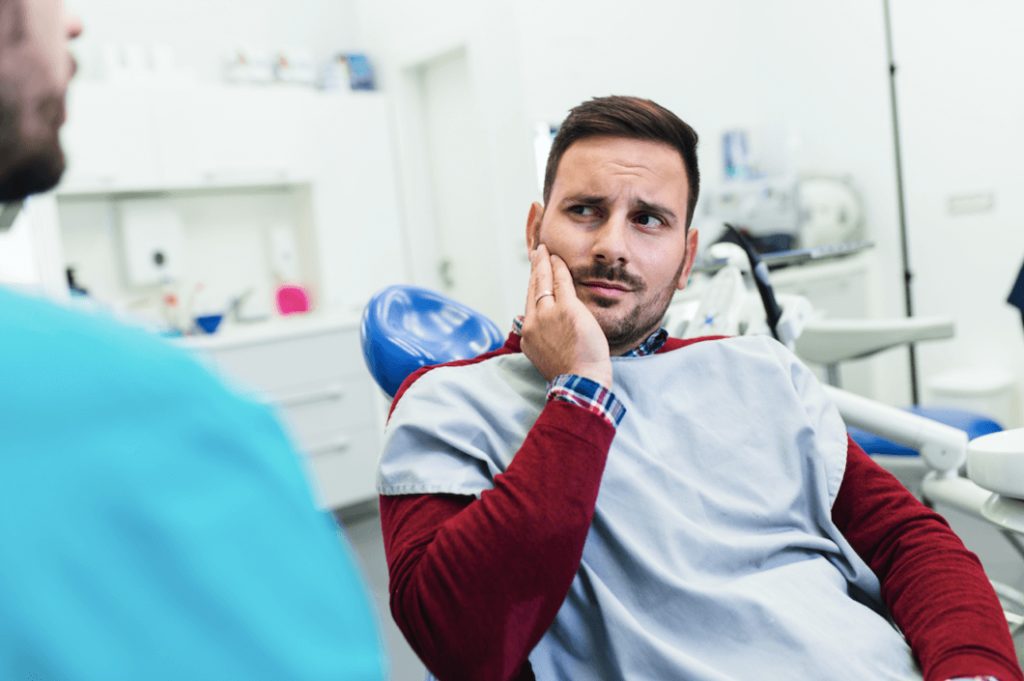The TMJ are the temporomandibular joints. These joints aid in speaking and chewing. There are multiple common causes of TMJ disorders, including stress, joint inflammation or injury, and poor posture. These problems put a strain on the jaw and muscles of the face.
Patients who develop TMJ disorders may find it painful to bite and chew due to pressure and stress on the teeth, face, and jaw. We offer TMJ treatment in Rosedale, MD to restore oral health and function to the bite.
TMJ treatment is one of the restorative dentistry services we offer in Rosedale, Baltimore County, MD. At Rosedale Family and Cosmetic Dentistry, we help patients find the right treatments for tooth wear, jaw pain, and other symptoms of TMJ disorders.


Symptoms of TMJ Disorders
Common signs of TMD include:
- Jaw pain and stiffness
- Clicking and popping jaw joint
- Clenching or grinding teeth (Bruxism)
- Chronic headaches and migraines
- Difficulty with biting and chewing
Please contact our office if you have noticed these TMD symptoms. TMJ disorders can be subtle at first. Many patients may not realize they have a TMJ disorder because their symptoms occur unconsciously or at night.
However, if you notice tooth, jaw, or facial pain, we ask that you call us for a consultation. Left untreated, TMJ disorders can lead to tooth damage, periodontal concerns, and damaged jaw joints.
Treating TMJ Disorders
For patients with mild to moderate TMD, we recommend physical therapy and oral appliances. During physical therapy appointments, patients learn jaw and arm exercises. These exercises improve the posture and alleviate pressure from the facial and jaw muscles.
Along with physical therapy, we may recommend that patients go on a soft diet. Avoiding hard and chewy foods allows the jaw joints and muscles to rest. For some patients, malocclusion is the cause of a bite problem. Orthodontic treatment can be used to straighten teeth and improve symptoms by creating a balanced bite.
Oral appliances such as nightguards are worn to stop patients from clenching and grinding their teeth. Bruxism is a common symptom of TMJ disorders that occurs during sleep or stressful situations. Made of acrylic, nightguards stop teeth grinding from wearing down the tooth enamel. Nightguards also alleviate pain and pressure from the joints and muscles of the face.
TMJ Treatment FAQs
What position should I sleep in for TMJ?
The best position to sleep in with TMJ is on your back. This keeps your back and neck aligned, and takes some of the pressure off of your jaw. Moreover, the worst position to sleep in is laying on your side.
What is the difference between a night guard and a TMJ splint?
Splints and night guards are both used to stop teeth grinding, but their purposes are different. A night guard only shields the teeth from grinding, while a TMJ splint stabilizes the jaw and is individually made for each patient.
Does TMJ change your smile?
You may not be able to smile at all due to TMJ. Your capacity to smile depends on your temporomandibular joint, so any pain there can make it challenging to move your mouth. TMJ Treatment can help restore jaw function, and in turn, make it easier and less painful to smile.
Is TMJ caused by misaligned teeth?
Malocclusion, often known as a misaligned bite, is one of the most common causes of TMJ problems. A misaligned bite can be brought on by genetics, trauma, missing or worn-down teeth, bad posture, or genetics. Correcting tooth misalignment can also help correct issues caused by TMJ.
Schedule a Dental Consultation
Do you often wake up with jaw pain? It may be TMD. Contact our dental office for care at (410) 376-8548 or request a dental appointment on our website.
